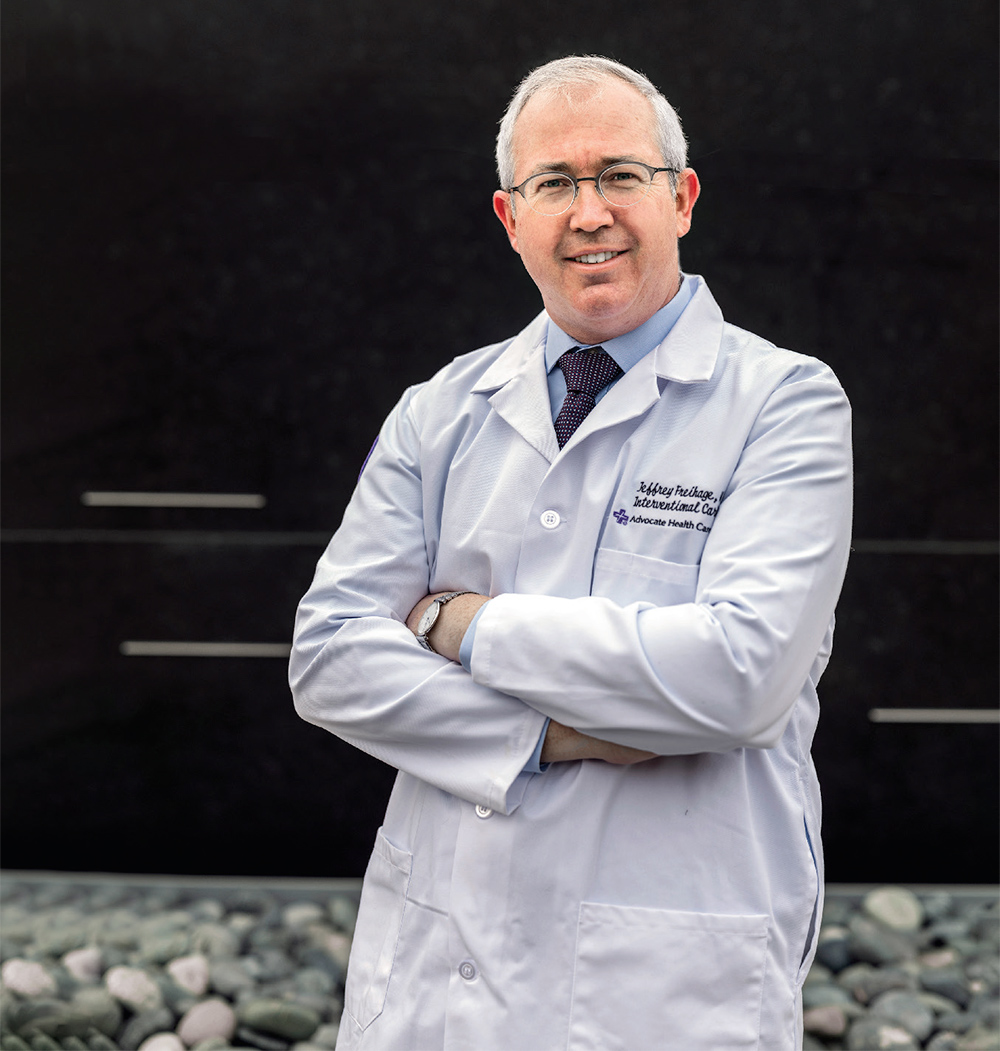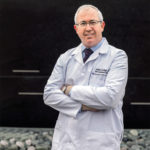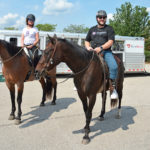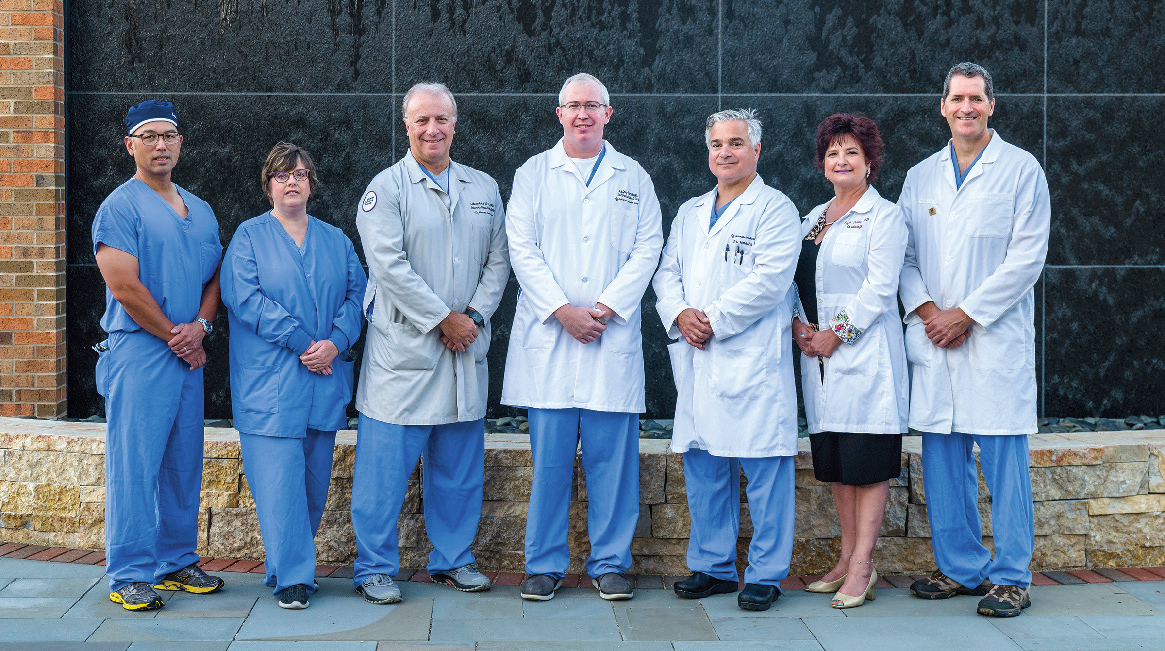
Advocate Good Shepherd Hospital’s medical team for heart health is (from left) Dr. John Lee, Anesthesiologist, Dr. Andrew Kotis, Interventional Cardiologist, Dr. Jeff Freihage, Interventional Cardiologist, Medical Director Structural Heart Program, Dr. Doug Tomasian, Interventional Cardiologist, Dr. Irina Staicu, Cardiologist, Medical Director Non-Invasive Cardiology, and Dr. Michael Fox, Anesthesiologist.
Mending Broken Hearts
Interventional Cardiologist Dr. Jeffrey Freihage Goes the Extra Mile
Written By LISA STAMOS
Advocate Good Shepherd’s TAVR expert, Dr. Jeffrey Freihage, is exactly who you’d want on your cardiology team. Dr. Freihage shares decision making for heart patients with Dr. Timothy Votapka, the open-heart surgery expert there. As a requirement of their profession, the two sit down with each other and additional team members to spend quality time discussing each individual heart patient’s needs, and they work to come up with the right plan. There are two distinct paths—open heart surgery, or the much less invasive TAVR procedure.
Dr. Freihage says a person’s age is one of the most important factors in whether to choose a TAVR or open-heart surgery approach. If young, below age 65, he says open heart may be best. If over 80, the TAVR makes sense. And those between 65 and 80—that’s a topic of those important team discussions.
“For a TAVR procedure, we go through an artery, usually the femoral artery, with a catheter that takes a tissue-based valve up to the heart,” Dr. Freihage said. “The old, calcified valve that’s not opening and closing enough then becomes the foundation to which the stent is positioned. The old valve stays put, and the new valve starts to work allowing the blood to flow properly.” In open heart surgery, the old valve is likely removed with a new valve then put in its place.
A Cardiologist’s Early Influences
Jeffrey Freihage grew up in Buffalo Grove with parents who ran a commercial plumbing business. Mom ran the business, and dad, a licensed plumber, was in the field doing the estimates. During summers in high school, Jeffrey would earn a job card from the Local 130 Union to do work with plumbers. There he learned about plumbing and saw nice buildings being constructed for medical offices. He knew he would be going to college and wanted to someday have a job that paid well, but also “helped humanity”.
With exposure to the plumbing trade—a cardiological metaphor not lost on Dr. Freihage—there was another childhood experience that altered his life and influenced his journey to medical school. At the tender age of 4, he lost his older brother, TJ, who was 7. TJ had an illness that Dr. Freihage believes he would have survived, were it with today’s medical standards and achievements. He credits his strong drive to help others, in part, to this heartbreaking loss.
Going the Extra Mile
All of Dr. Freihage’s medical training took place in Chicago. He attended Loyola Academy for high school, followed by Northwestern University where he earned a Bachelor of Science in Biological Sciences. He attended Loyola University Chicago’s Stritch School of Medicine for four years of medical training. His internal medicine residency and two years of training in interventional cardiology were also there. Usually, medical students only stay for one year for their specialty training, but Dr. Freihage has a different perspective. “If you want to be really good at something, you have to do it a lot. I stayed an extra year to learn more than coronary training, but also to learn about the peripheral work,” he said. “I wanted to be busy as an Interventional Cardiologist which would further my learning and capabilities.”
Starting out at Mercy in Chicago for his medical career offered the experience of working with patients who lived in an underserved area of society. He learned a great deal about procedures working at this location. He later joined a practice associated with Alexian Hospital in Elk Grove Village, where he was happy with the doctors, but not with the leadership of the practice. After seven years there, he joined Advocate Aurora Health at Good Shepherd Hospital.
Reflecting on the spectrum of people he’s worked with, Dr. Freihage has an observation. “It doesn’t matter whether you’re the poorest guy on the block, or the wealthiest. None of it matters if you don’t have good health. My job is to give them their health back, and if I can do that, I’ve won that battle for them,” he said.
Advocate Good Shepherd Hospital’s medical team for heart health is (from left) Dr. John Lee, Anesthesiologist, Dr. Andrew Kotis, Interventional Cardiologist, Dr. Jeff Freihage, Interventional Cardiologist, Medical Director Structural Heart Program, Dr. Doug Tomasian, Interventional Cardiologist, Dr. Irina Staicu, Cardiologist, Medical Director Non-Invasive Cardiology, and Dr. Michael Fox, Anesthesiologist.
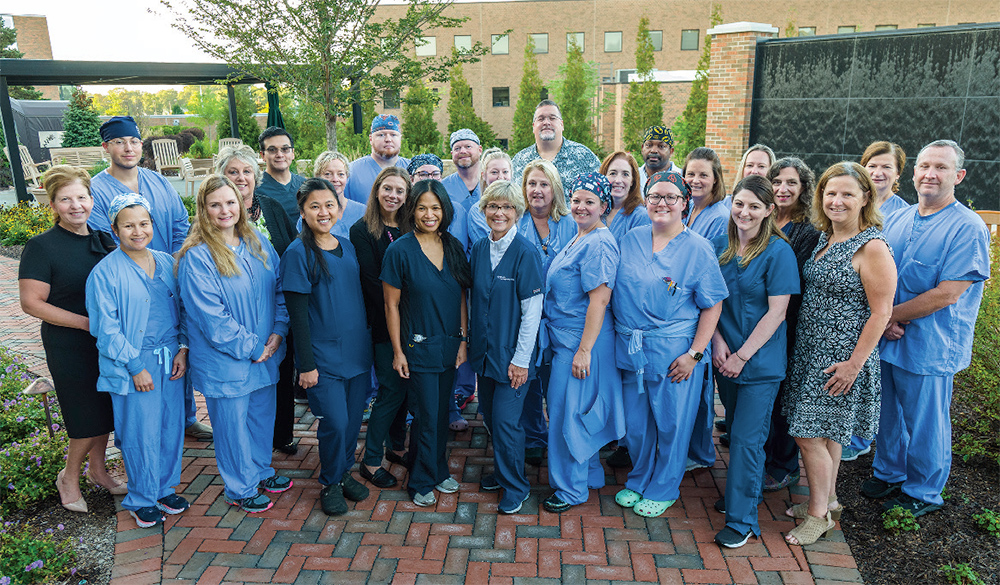
Advocate Good Shepherd Hospital’s cardiology staff.
Understanding the TAVR Procedure
TAVR Offers an Option to Open Heart Surgery
Written By Donna Hopp, RN
Aortic Valve Stenosis is one of the most common and serious heart valve disease problems. Today, 2.5 million Americans over 75 years of age suffer from aortic stenosis. Aortic valve stenosis is the medical term for a “tight” valve that fails to open properly.
Aortic stenosis is a progressive disease. Symptoms are often confused with normal signs of aging such as fatigue, rapid heartbeat, dizziness, light headedness, shortness of breath, and swollen feet or ankles. Once a patient with severe aortic stenosis develops symptoms, survival rate can be as low as 50% at two years.
For many years, Surgical Aortic Valve Replacement (SAVR) was the “gold standard” treatment for severe aortic valve stenosis. Surgical Aortic Valve Replacement (SAVR) requires the opening of the chest or open-heart surgery to replace the stenotic “tight” valve. In the past, patients who were too high-risk for surgical replacement were medically managed which may improve symptoms but does not extend life or slow disease progression.
TAVR Is Approved By FDA
In 2008, the FDA approved Transcatheter Aortic Valve procedure (TAVR) for these high-risk patients. TAVR is a less-invasive procedure that involves making a small incision in the leg and using a small catheter or tube, the new heart valve is threaded to the heart and is placed directly over the diseased valve. In 2019, the FDA approved TAVR as an alternative for patients with aortic valve stenosis at low risk, as well.
In August of 2019, the first TAVR procedure was performed at Advocate Good Shepherd Hospital. At Good Shepherd, TAVR is coordinated and performed by a specially trained heart team. The TAVR team consist of Interventional Cardiologists, Anesthesiologist, Cardiothoracic surgeon, Invasive and CV OR Team members, Echo Sonographer, and our RN Valve coordinator. Each case is reviewed in our valve clinic with our physician leaders and the most safe and effective treatment option is recommended. Post procedure, patients often experience immediate decrease in shortness of breath. For eligible patients, TAVR provides many benefits over traditional surgery. Because TAVR is less invasive, benefits include a shorter hospital stay, less pain and anxiety, and faster recovery time.
In May 2021, Advocate Good Shepherd celebrated performing over 100 of these revolutionary TAVR procedures. Could TAVR be a possibility for you? To receive more information or to request an evaluation by our valve team, contact Donna Hopp, RN Valve Coordinator at Advocate Good Shepherd at 847-842-4476.
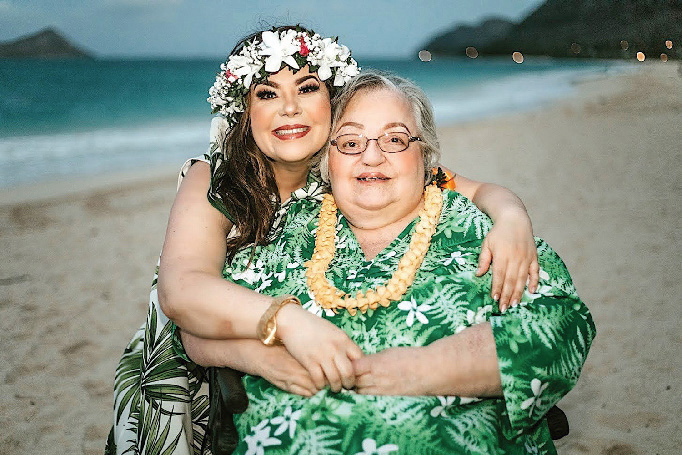
Wendy Roach and JoEllen Roach, her mom, make their dream trip to Hawaii.
A Patient’s Perspective on TAVR
JoEllen Roach, a 48-year resident of Cary, Illinois, was used to being active and like so many, took pride with her independent lifestyle at 76 years of age. Her daughter Wendy, crowned Miss Plus Intercontinental 2021, often travels, bringing her mom on the trips.
However, a couple of years ago, Jo Ellen began experiencing difficulties. Her breath shortened, and even walking from room to room was a challenge. She was too exhausted to cook, something she loves to do. No longer able to travel with her daughter, Wendy would Skype from distant places like the Bahamas to stay in touch with her mom.
“Not only had I become dependent on oxygen, but I had chest pain and heart flutters, which caused me fear and anxiety,’ JoEllen said. “My health kept me from doing what I wanted to do. I couldn’t even play with my grandchildren.”
JoEllen met with Dr. Jeffrey Freihage, Advocate Good Shepherd’s Medical Director of the Structural Heart Program and an Interventional Cardiologist, along with Dr. Timothy Votapka, a Cardiovascular Surgeon—a team who represents two points of view on heart surgery—to discuss her options. The recommendation for JoEllen was a TAVR procedure, a much-less invasive option than open heart surgery.
“The team walked hand-in-hand with me to discuss my options,” JoEllen said. “They made every effort to educate me including a video I reviewed. The medical staff’s bedside manner was down-to-earth, and they answered all my questions. I love the nurses! I was fully at ease before, during, and after the procedure,” she said.
After the procedure, JoEllen says her recovery time was fast. “The first thing I did right after surgery was to take a deep breath,” JoEllen says. “I started to cry; I could fully breathe again. I could sit up right away. I was home the next day, and my follow-up was to keep my incision area clean and dry.” Five days post-op JoEllen says she felt fantastic.
Today, JoEllen cooks more, can do more things for herself, and travels through her home with greater ease. “I have energy available now to play with my grandchildren. I was even able to take a dream trip to Hawaii with Wendy, something I had hoped to do with my late husband.”
JoEllen says that Dr. Freihage went beyond her expectations and that her team took the time to go through all the details. Going forward, JoEllen will be on twice-yearly check-up plan. “I am very grateful for the care and compassion I received. Thank you Dr. Freihage for giving me my life back!”
– End –
Share this Story

